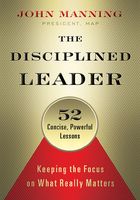

Manage Your Worries
In your efforts to build greater courage, you might find yourself preoccupied with worry. The origins of the word worry are in the root words for choke or strangle. Worry is a toxic emotional condition that can feel like it’s choking us at times, even though most of what we worry about doesn’t ever happen. Nevertheless, many of us spend a lot of energy on the “what ifs” in life. We often find ourselves thinking about threats, pitfalls, and failures—a mindset that, like fear, can easily spiral out of control and hold you back from reaching your potential.
It’s important for you to spot worry and realize its symptoms. Anxiety and procrastination can paralyze your potential to lead effectively. Chronic worrying can not only keep you from acting when you need to the most, but it can also blow you off an already windy course, prevent goal achievement, and crush dreams. Worse, it may even fuel compulsive and self-defeating behaviors.
MAP had a client whose vice president of human resources was struggling with her boss, the CEO. Specifically, the CEO wasn’t listening to all the recommendations that the VP was making to support the management team. Therefore, the VP was both frustrated and worried. In the end, however, the VP couldn’t control her boss, only her worries. So MAP coached her to invest more energy into those areas and aspects of her work that she could control. The result was reduced stress and anxiety.
We all struggle with worry. Try to make a new personal commitment to courageously ignore what’s out of your hands, zero in on the present, and then act on what you can control.
Here are a few suggestions to help you leave your worries in the wind:
Understand that worrying is not a solution. Some people get stuck in a worry rut, where they seemingly enjoy or feel comfortable dwelling in their anxiety. There are also those who believe that by constantly thinking about what could happen, they’re going to be prepared for whatever comes their way. They allow worrying to be the strategy for managing fears about the future. Most of their anxieties are about things that won’t ever happen. Worse, they spend a lot of time fretting over what eventually amounts to a lot of nothing. What’s the lesson for you? Anything that needlessly robs you of your time, energy, and other precious resources is destructive to you and your leadership. Remember: the Vital Few, not the Trivial Many.
Surface your worries. One of the best ways to address worries effectively is to get them out of your head by talking with a trusted confidant, someone who can help you sort through your thoughts, feelings, and options. It could be a mentor—a coach who can provide much-needed perspective and help you achieve greater clarity and calm. If you’d prefer not to talk to someone, simply writing down your worries on paper can be useful. Carve out a few minutes every week or day (if necessary) to make a list of those troubles. Categorize your list: (1) what you can control; and (2) what you cannot control.
Reduce worries. Once you identify what you can control, create an action plan. For example, if you’re worried about losing your job but see that event as something you can likely prevent, then ask what steps you can take to do just that. Perhaps you will work more hours, show more enthusiasm at work, nurture key relationships, learn new skills, and so on. There are no guarantees in life, but if you proactively take control where you can, you’ll most likely reduce your worries.
In Summary: As with fears, The Disciplined Leader gets a grip on useless worries that can spiral out of control. To lead others, your first responsibility is to lead yourself. Doing so requires controlling and combating worries. Failure to manage anxieties will adversely influence your ability to lead.
Take Action!
 Make a list of things you can control—and those you can’t control. Develop an action plan to tackle what’s controllable and prioritize your list. Periodically review this list and update it.
Make a list of things you can control—and those you can’t control. Develop an action plan to tackle what’s controllable and prioritize your list. Periodically review this list and update it.
 Gather a close group of friends and/or colleagues who can give you suggestions and advice on the things you worry most about. Give them the space to be honest with you.
Gather a close group of friends and/or colleagues who can give you suggestions and advice on the things you worry most about. Give them the space to be honest with you.
 Read books and find other resources to help develop your problem-solving skills. You will diminish your worries as you become more adept at problem solving.
Read books and find other resources to help develop your problem-solving skills. You will diminish your worries as you become more adept at problem solving.